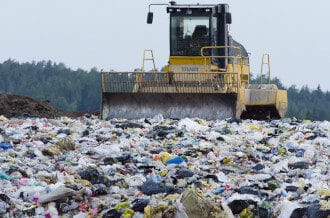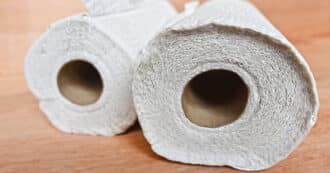By Harry Cooper – Single use items have become a nuisance to keeping our planet clean. And single use cups are no exception to this. Landfills and oceans have started filling up with Styrofoam, plastic, and paper. While recycling can help reduce waste, many items made from these materials, especially cups, are not always so easy to recycle. Reusable cups present a solution.
Ditching Disposable Cups
The answer to this problem may lie in ditching the disposable cup all together. When you drink your beverage from a reusable cup, switching to a reusable cup requires no wasteful materials to be made into a cup or thrown out what-so-ever!
Disposable Cups are Wasteful
Every disposable cup that gets thrown away contributes to the larger waste problem that our planet is facing. Trash is piling up in our landfills and oceans and causing serious environmental damage.
Cups as Ocean Waste
Every year around 14 million tons of plastic make their way into the ocean. This trash makes up 80% of all ocean debris and can kill animals that get entangled in it or attempt to eat it, which can cause big disruptions in marine ecosystems.
Cups in Landfills
Waste created by single use cups are also pilling up in landfills. Disposable cups fill up landfills fast and can cause some serious harm, such as toxic chemicals leaking into the environment and even raising property values.
Types of Disposable Cups
Styrofoam Cups
Styrofoam coffee cups are really popular for hot coffee, iced coffee, or even tea. But using this kind of cup for your hot morning brew can have some serious environmental impacts.
Styrofoam is incredibly hard to recycle, and often ends up in landfills and oceans. Not only that, but Styrofoam is estimated to take up to 500 years to decompose, meaning it will stay in the environment a very long time.
Styrofoam is also known to release deadly carcinogens when heated up. This can cause harmful air pollution when Styrofoam sits outside, in a landfill or floating on the ocean, baking in the hot sun. Not only that, if you’re someone who drinks hot coffee out of a Styrofoam cup, these toxic chemicals could wind up in your coffee.
Paper Cups
Paper is notorious for being a highly recyclable material. However, making a cup out of paper is a different story. Paper is not a strong enough material to hold liquid on its own, so paper cups are often double walled and reinforced with a slew of chemicals that make paper cups incredibly hard to recycle.
Plastic Cups
While some plastic cups can be recycled, many cannot be, and often wind up in our oceans and our landfills. Before plastic can decompose, (which can take over 450 years), it often breaks down into deadly microscopic pieces called microplastics.
These microplastics contain harmful chemicals that can leak into the ground and water. When animals, often marine animals, consume microplastics, it can seriously harm them and their ecosystem, and subsequently, when humans eat fish containing microplastics, they end up with toxic microplastics in their bodies.
The Benefits Of Switching To A Reusable Cup
Switching to a reusable cup can be a great way to combat waste. By not having to use a new cup every time you buy a drink, you stop having to worry about throwing away your cup and creating waste at all.
Not only do reusable cups have numerous environmental benefits, but they also have some personal benefits as well. Coffee shops all over the world have started promoting the use of reusable cups.
Not only does switching to reusable coffee cups save them money, but it also saves you money. Several coffee shops have started giving discounts to people who bring their own cup, making reusable cups a win-win for everyone.
Reusable Cups and Religion
If instead of using reusable cups, we continue using plastic cups, our descendants will have to pay the costs. This is explained in Eco Bible, as Rabbis Yonatan Neril and Leo Dee discuss the similarity between the difficulty of getting rid of the effects of sin, and the difficulty of getting rid of the effects of plastic. They comment on the following quote from the Bible: “Because of their iniquity, your remnant will disintegrate in the lands of your enemies; and because the sins of their forefathers are with them as well, they will disintegrate” (Leviticus 26:39).
Rabbi Shlomo ben Yitzchak (Rashi) explains that the Hebrew word for disintegrate used in the Bible means dissolve. In our times, it is ecological sins, of both current and previous generations, that have been dissolved into nature and are not going away. CO2 from fossil fuel emissions remains in the atmosphere for about 100 years. Over the past 200 years, about 38 percent (500 gigatons) of human-caused CO2 emissions have also dissolved into the ocean, making the seawater hotter and more acidic. This acidification has contributed to the dying, or bleaching, of vast coral reefs. Scientists note that human heating of the ocean directly harms marine life and has the potential to harm all living things on earth. The Bible does not shy away from warning of curses due to such human failings: “Because of their iniquity, your remnant will disintegrate in the lands of your enemies.” Our children will suffer from the carbon excess of our and previous generations released into the atmosphere and dissolved in the ocean.
Plastic pollution is a human-caused detriment which never fully dissolves or decomposes. It breaks into smaller and smaller particles until it reaches the size of microplastics, now even being detected in many food products and tap water. Making the health threat even worse, a recent study noted, “Microplastics have been shown to absorb toxic chemicals linked to cancer and other illnesses, and then release them when consumed by fish and mammals.” Microplastics are now seemingly ubiquitous as they have been found in the deepest ocean, on the highest mountains, and in the atmosphere.
In one success story, the East African country of Malawi banned the production, importation, distribution, and use of thin plastics, including thin, plastic bags. Gloria Majiga-Kamoto, a 30-year-old Malawian environmental activist, engaged in a multiyear campaign to promote such a ban.
Let Us Raise Our Reusable Cup – Cheers to Change!
Gloria Majiga-Kamoto shows that shifting from throw-away plastics to reusable items is possible. We love our plastic, but it’s not too late to change. And I’ll raise my glass to that!
* Featured image source








